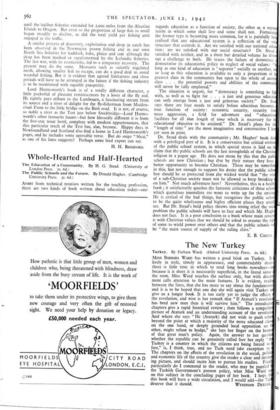The New Turkey .
Turkey. By Barbara Ward. (Oxford University Press. 2S. 6d.) MISS BARBARA WARD has written a good book on Turkey. It lively in style, timely in appearance, and commendably short there is little time in which to read long books nowadays—a because it is short it is necessarily superficial, in the literal sense the term. Miss Ward touches the surface only, but with disce ment calls attention to the main features. It is evident, reach between the lines, that she has more to say about the fundament and it is to be hoped that one day she will again visit Turkey give us a longer book. It is too early yet to judge the effects the revolution, and wise is her remark that " If Ataturk's revoluti has bred new men then it will survive him." The introducto chapters give a rapid historical review; follows a sympathe picture of Ataturk and an understandig account of the revolun And where she says "He (Ataturk) did not wish to push refo beyond the point at which a majority of the more educated clas on the one hand, or deeply grounded local opposition on t other, might refuse to budge," she lays her finger on the keyno of that great man's policy. Again, the answer to her quest whether the republic can be genuinely called free her reply " th Turkey is a country in which the citizens are being forced to free," is, I think, true, and no Turk need take exception to The chapters on the effects of the revolution in the social, politi and economic life of the country give the reader a clear and intere ing picture, and should incite him to pursue his studies. Fin particularly do I commend to the reader, who may be puzzled the Turkish Government's present policy, what Miss Ward 53 on this subject in the concluding pages of her book. I hope this book will have a wide circulation, and I would add—the T


























 Previous page
Previous page